How to strengthen your gut and actively keep it healthy
You probably know how challenging it can sometimes be to keep an apartment clean and intact at all times. It's no different with our largest internal organ. The intestine has an impressive total surface area of around 32 square meters. For this reason, and not least because of its many folds and nooks and crannies, it also needs regular care. Its immense size and the complexity of its functions make the gut susceptible to various problems, including intestinal inflammation. It is therefore important for your physical well-being to strengthen your gut in order to protect it from diseases such as inflammation. In this article you will learn more about the structure...


You probably know how challenging it can sometimes be to keep an apartment clean and intact at all times. It's no different with our largest internal organ. The intestine has an impressive total surface area of around 32 square meters. For this reason, and not least because of its many folds and nooks and crannies, it also needs regular care.
The immense size and complexity of its functions make the gut susceptible to various problems, including intestinal inflammation. It is therefore important for your physical well-being to strengthen your gut in order to protect it from diseases such as inflammation.
In this article you will learn more about the structure and function of the gut, the causes and symptoms of intestinal inflammation and the best strategies for staying healthy in the long term.
Reading tip: Are you interested in what massages can do? Find out more in our article "From head to toe: massages help here"
Note: This article does not replace medical advice. Please always consult a healthcare professional if you have persistent symptoms.
The human intestine: structure and function

The intestine is one of our most important organs in the body. It is a looped tube of muscle. If the bowel hurts, it is therefore actually a form of muscular discomfort.
This organ is fascinating, extremely complex and plays a crucial role in our digestive system. Its two main parts are the small intestine and the large intestine, which work together to digest food, absorb nutrients and eliminate waste.
The small intestine is responsible for the absorption of nutrients and vitamins, while the large intestine absorbs water and salts from the remaining food pulp and forms the stool.
The gut is also home to a large number of microorganisms that support our health. This intestinal flora is essential for a well-functioning immune system and general health.
Inflammatory bowel disease: What is it?
Intestinal inflammation is also known as enteritis and is an inflammation of the mucous membrane in the intestine. Such inflammation can occur in both the small and large intestine and has various causes.
Typically, intestinal inflammation leads to symptoms such as abdominal pain, diarrhea and nausea. Inflammatory bowel disease can be acute or chronic, which makes long-term treatment necessary. And with around 400,000 people in Germany alone suffering from chronic inflammatory bowel disease, the prevalence is relatively high.
Occurrence and types of intestinal inflammation
Intestinal inflammation can affect people of all ages and can basically be divided into two main categories: infectious and non-infectious intestinal inflammation.
- Infectious intestinal inflammation: This form is caused by viruses, bacteria or parasites. Common pathogens are noroviruses, salmonella and coli bacteria. Infectious enteritis often occurs suddenly and is associated with symptoms such as severe abdominal pain, diarrhea and fever.
- Non-infectious intestinal inflammation: This category includes chronic inflammatory bowel diseases such as Crohn's disease and ulcerative colitis. These diseases often have a genetic component and can be influenced by environmental factors and the immune system. Symptoms include prolonged abdominal pain, diarrhea and general malaise.
But what are the causes of intestinal inflammation and why are some people more susceptible to it than others?
Intestinal inflammation: Possible causes
The tricky thing about intestinal inflammation is that the causes can be triggered by both external and internal factors. The most common triggers include
- Heredity: Genetic predispositions play an important role. If there are known cases of chronic inflammatory bowel diseases such as Crohn's disease or ulcerative colitis in the family, the risk is increased.
- Medication such as antibiotics: The use of certain medications, especially antibiotics, can unbalance the natural intestinal flora and promote inflammation. Antibiotics not only kill off harmful bacteria, but also impair the beneficial bacteria in the gut.
- Stress: Chronic stress has a negative impact on the digestive system and can promote intestinal inflammation. Stress hormones such as cortisol have an effect on intestinal movements and the mucous membrane. Incidentally, stress is one of the factors that can be controlled with a little self-care. Regular relaxation and massages not only have a positive effect physically, but also mentally.
- Diseases: Other diseases such as coeliac disease, irritable bowel syndrome and diabetes can also increase the risk of intestinal inflammation. These diseases impair the function of the intestine and make it more susceptible to inflammation.
With this large number of triggers, it is all the more important to recognize symptoms and signs at an early stage in order to be able to react accordingly.
Reading tip: In the case of chronic inflammatory bowel disease, pain therapy can help those affected to cope with the disease. In our article on pain management you can find out more about the topic.
Symptoms of intestinal inflammation
Intestinal inflammation can cause varying symptoms depending on the cause and severity. However, there are signs that are particularly common. These include
- Abdominal pain: Often cramp-like and felt throughout the abdomen.
- Diarrhea: Frequent, watery stools, sometimes accompanied by blood or mucus.
- Nausea and vomiting: These symptoms occur particularly with infectious intestinal inflammation.
- Fever: A typical sign of infectious inflammation.
- Tiredness and weakness: Due to the loss of fluids and nutrients, those affected often feel exhausted.
These symptoms can have a severe impact on daily life and therefore require targeted treatment and, of course, prior diagnosis.
How is inflammatory bowel disease diagnosed?
The diagnosis of intestinal inflammation usually begins with a detailed medical history and a physical examination. Blood and stool tests are often carried out to determine the exact cause.
These tests can be used to detect infections and recognize indications of inflammatory processes in the intestine. In some cases, additional imaging procedures such as ultrasound, CT or a colonoscopy are required to examine the affected areas of the intestine in more detail and to rule out other diseases. Once the diagnosis has been made, the next step is to determine the appropriate treatment for the intestinal inflammation.
Reading tipCorona infection is often accompanied by intestinal complaints and muscle pain. We have Tips on strategies to combat pain after contracting the virus and Long Covid.
What are the treatment options for intestinal inflammation?
Depending on the cause and severity of the disease, there are different treatment approaches for inflammatory bowel disease. Some of the most common methods are
- Drug treatment: In the case of infectious intestinal inflammation, antibiotics or antiviral drugs are often prescribed to combat the pathogens. Anti-inflammatory drugs such as corticosteroids, immunosuppressants and biologics are used for chronic inflammatory bowel diseases.
- Home remedies: Natural approaches can help to alleviate symptoms. Chamomile tea, ginger and fennel are known for their soothing properties on the gastrointestinal tract. Probiotics can also have a supportive effect by rebalancing the intestinal flora.
- Nutrition: An adapted diet plays an important role in the treatment and prevention of intestinal inflammation. Easily digestible foods such as bananas, rice and steamed vegetables are often well tolerated. Dairy products and spicy foods, on the other hand, should be avoided.
How can intestinal inflammation be prevented?
Ideally, intestinal inflammation should not occur in the first place. It is therefore clearly worth looking into preventive measures to significantly reduce the risk of illness from the outset. So what can you actively do?
- Nutrition: A high-fiber diet with plenty of fruit, vegetables and whole grain products supports intestinal health. Sufficient fluid intake is also important.
- Exercise: Regular physical activity promotes bowel movements and contributes to general health. Even a daily walk can have a positive effect.
- Massages: Abdominal massages can promote blood circulation and digestion, helping to prevent intestinal inflammation. Gentle techniques are particularly beneficial. In general, massages aimed at reducing stress are beneficial for intestinal health.
Strengthen the gut with the right diet: What can help, what can harm?

As the most important digestive organ, it is obvious that nutrition plays a central role in the health of our gut. A gut-friendly diet can prevent and alleviate inflammation. Helpful foods include:
- Dietary fiber: They support digestion and promote healthy intestinal flora.
- Probiotics: These promote the growth of beneficial bacteria in the gut.
- Omega-3 fatty acids: Their anti-inflammatory properties offer additional protection and are found primarily in oily fish and linseed.
Foods you should avoid:
In addition to foods that prevent bowel disease, there are of course also foods that are particularly harmful in the long term and if consumed regularly. These include
- Alcohol and caffeine: Irritate the intestinal wall and should only be consumed in moderation.
- Foods high in sugar: Sugar can promote the growth of harmful bacteria in the gut and encourage inflammation.
- Processed foods: Often contain additives and preservatives that can irritate the gut.
Making conscious food choices helps you to support your gut health and avoid discomfort. And there's more you can do.
Exercise and massages can help to strengthen the intestines
Regular exercise and targeted massages can also have a positive effect on intestinal health. Exercise generally promotes your blood circulation and supports natural bowel movement, which can prevent digestive problems.
Abdominal massages, especially techniques similar to a Swedish massage or gentle lymphatic drainagehelp to stimulate intestinal movement and reduce flatulence. These measures can be used both preventively and as an adjunct to the treatment of intestinal inflammation.
As is so often the case with health issues, proactivity is the key to better well-being and results.
Strengthen the gut: Take your gut health into your own hands
It takes at least as much care to keep your intestines healthy as it does to keep your own four walls clean. With a balanced diet, regular exercise and stress-reducing measures such as massages, you can promote your intestinal health and prevent intestinal inflammation.
Pay more attention to your body's signals and don't be afraid to seek medical advice if your symptoms persist. In this way, you can actively support your gut health and improve your quality of life in the long term.
Cover image: Alicia Harper, other images: Elionas2, Devon Breen

Co-founder and Managing Director of Massage Chair World. With his expert knowledge and industry expertise, he helps private individuals and companies to find the right massage chairs for relaxation, health and vitality. The individual expert advice is provided both by telephone or video chat, as well as in the exhibition outside Stuttgart.




